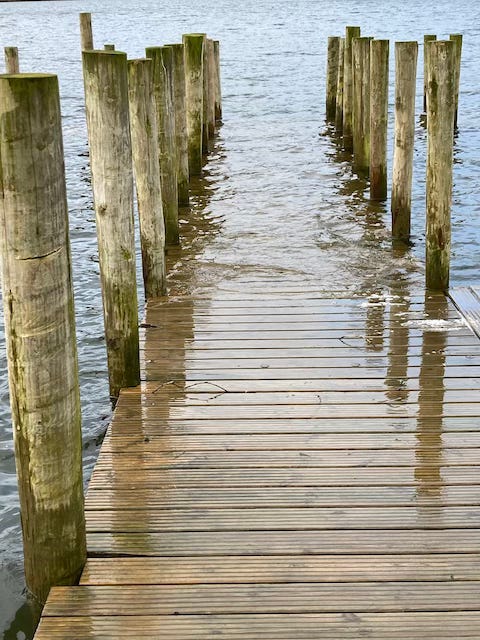Writing - and the "sour sweet music" of Time
"I wasted time, and now doth Time waste me" - 'Richard II', Act V, scene v
I recently re-watched Simon Sharma’s two-part documentary on Shakespeare, programmes specifically focussed on the history plays Richard II, Henry IV (parts I and II), and Henry V. It was enough to spur me on to revisit the BBC’s The Hollow Crown adaptations once again. I have just finished watching Richard II.
Perhaps it was as a result of having my sensibilities re-awakened that I found myself inevitably marvelling at Shakespeare’s language and moved by the eventual plight of Richard who, it seems, was never cut out to be a king. I don’t recall the history plays having ever been a favourite when studying the Bard all those years ago (after all, they are nowhere near as sexy as the tragedies!) but that doesn’t mean they’re not packed with the kind of imagery and language of which we mere mortals can only dream - and which were especially significant given the historical context (Elizabeth I & James I, Tudors & Stuarts, Protestants & Catholics) in which they were written.
If one could achieve something as remotely impactful in our turbulent times, what would that need to look like?!
Maybe it would be the only writing with any true worth.
On an entirely different scale (but still a universal one) Richard II had me reflecting on the nature of ‘Time’ and our relationship to it, both as individuals and as writers. A little like an incoming tide - or an unstoppable flood (hence the photo) - we can do nothing about the passing of time. The past is ever-greater, and the future nibbles away at itself.
I have always been fascinated by our relationship to time and the individual histories it creates: not only my own (obviously!) but those of others, including fictional characters. Much of my work seeks to try and dissect that relationship, to try and understand how we process what has happened to us - and what might happen yet. But as I do so, the water-level continues to rise and my early history appears more distant in the rear-view mirror (if I may be excused for mixing metaphors..!)
“I wasted time, and doth Time waste me”.
Indeed.
All of which, I think, begs a question of writers - given none of us wishes to waste our time: to what should we devote that time, our talent? The vast majority of us (me included!) seem content to beaver away within what might be regarded as a narrow scope, comfortable in our semi-obsession with a limited palette: our lives, our histories, or those of our characters. Or we are happy to eschew the personal in favour of the slight, the commercial, the consumable. Occasionally we make a token effort - that Covid poem or a meek protest against Ukraine, Gaza and the like - and then retreat to where we are comfortable and safe. Yet I wonder if we, as writers, share a responsibility to do more than ‘entertain’ (ourselves or others); whether what we do might be the vehicle to actually make a difference if sufficient of us shouted loudly enough…
Perhaps you need to be made a certain way in order to accept such a burden. Or you need to have a platform from which you can be heard - and listened to. One with the trappings of power perhaps, like a king…
Or perhaps you need to be a genius.
Most of us, I’m sure, recognise the tyranny of time and the imperative of making the most of what we have left. Perhaps we are satisfied with the examination of our own micro-worlds - or are happy to explore some huge and impossible world of our own creation.
And perhaps we’re all resigned to the incoming tide too.
But I can’t help but wonder if we shouldn’t strive for more than that.
All too often I look at my own work and the work of others and think “what’s the point?”; “what difference does another poem about autumn or love make?”; “who really cares about your memoir or mine?”; “can I write something that will make a difference?”
Perhaps this is existential nonsense stirred up by a sense of inadequacy and my reconsidering the history plays. Perhaps it’s recognition - or hope - that there must be more. And perhaps it’s also a lament against the flood, the wasting of precious time.
But maybe it belittles what I and the vast majority of other writers try to do: we strive to communicate, to inspire, to move - and, yes, to entertain. And to be recognised for doing so. If we achieve that on even a small scale, on an individual level, isn’t that something? If we can’t change the world but manage to touch someone… Doesn’t that have merit - even make a difference?
I suppose I tease at some of this in my new book, So, you think you’re a Writer (published at the end of this month). I ask questions about the ‘why’ of writing, who we write for, what kind of writer we are, and then examine what we’re writing too. The ‘why?’, ‘who?’ and ‘what?’ all play into our ambitions, our scope, any desire we may have to have an impact.
I confess I’m nervous about this one because it’s not fiction, because it’s about belief and opinion as much as anything.
And maybe I’m edging out from my micro-world just a little - or, Canute-like, staring down the flood.





